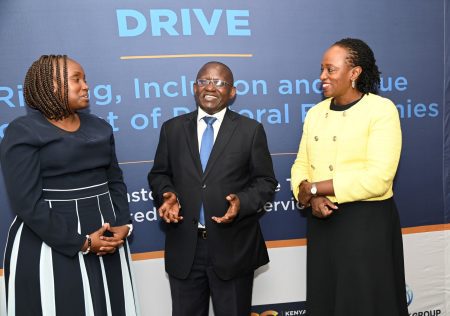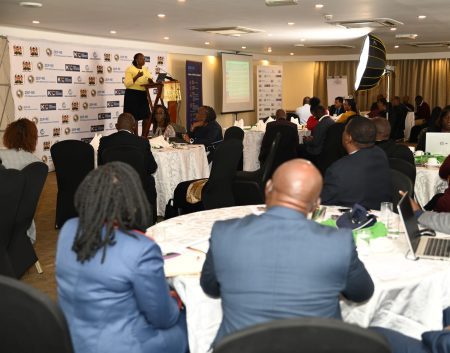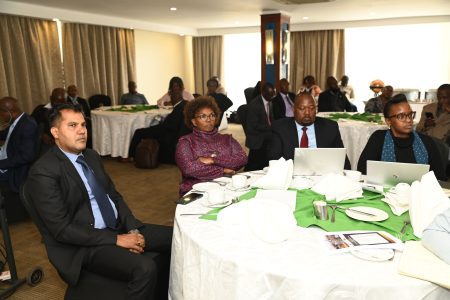DRIVE Project Launch in Kenya
11 April 2023: Boost for Pastoralists in Kenya as the Government is set to launch a $140M project to protect them against severe drought and enhance their inclusion in the broader economy
The Government, through the State Department for Livestock Development (SDLD), in partnership with ZEP-RE (PTA Reinsurance Company), Kenya Development Corporation (KDC) and the World Bank Group (WBG), are set to formally launch the De-Risking, Inclusion and Value Enhancement of pastoral economies (DRIVE) project.
 The DRIVE project aims to de-risk pastoral systems at the primary level through an integrated package of financial services that includes drought index insurance, savings, digital accounts and financial education, and at the value chain level through de-risking private sector investments that provide reliable markets to pastoralists.
The DRIVE project aims to de-risk pastoral systems at the primary level through an integrated package of financial services that includes drought index insurance, savings, digital accounts and financial education, and at the value chain level through de-risking private sector investments that provide reliable markets to pastoralists.
Speaking ahead of the launch, the Principal Secretary for Livestock Development, Harry Kimtai, said the project is expected to have a positive impact on enhancing the climate resilience of pastoral communities, addressing climate change, strengthening commercialization of livestock production, and ensuring the inclusion of the marginalized and vulnerable groups such as women and youth.
“The DRIVE project is a critical step towards the sustainable development of pastoralist communities in Kenya. By providing them with the necessary support and resources, the project will help increase their resilience and enhance their economic participation while promoting a more sustainable and inclusive economic development model in the country,” Mr. Kimtai said.
As part of the Horn of Africa Initiative, the DRIVE project will build the resilience of pastoral communities in Kenya, Ethiopia, Somalia and Djibouti. Over 250,000 households are expected to benefit from the project representing 1.6 million pastoralists and their dependents across the four countries over a five-year period.
In Kenya, over 150,000 pastoralists are expected to benefit from the project across the Arid and Semi-Arid Lands (ASALs). The project is also expected to create markets around the livestock value chain, enhance regional cooperation and peacebuilding, climate mitigation (improvement, fodder conservation and increased productivity), and closing the gender gap in access to financial services.
“Today marks a pivotal moment in Kenya’s development journey as we launch the DRIVE project. Our joint commitment to unlocking the full potential of pastoral economies is unwavering, and DRIVE is a big step towards achieving sustainable and inclusive development. We are confident that the project will drive positive change, creating new opportunities, empowering communities, and fostering resilient, thriving economies of the ASAL regions,” KDC Acting Director General Norah Ratemo said.
 In Kenya, the project has two components. Component 1 involves de-risking pastoral production through a package of financial services. This component aims to protect pastoralists against recurring drought shocks with a package of financial services, including drought index insurance, savings for resilience, digital accounts and financial education and awareness creation. ZEP-RE (PTA Reinsurance Company), the regional implementing agent, is delivering through collaboration with the government, development partners and private sector companies. The regional management of this component helps mobilize the private sector and create the scale necessary to transfer the risk of drought to the international insurance market.
In Kenya, the project has two components. Component 1 involves de-risking pastoral production through a package of financial services. This component aims to protect pastoralists against recurring drought shocks with a package of financial services, including drought index insurance, savings for resilience, digital accounts and financial education and awareness creation. ZEP-RE (PTA Reinsurance Company), the regional implementing agent, is delivering through collaboration with the government, development partners and private sector companies. The regional management of this component helps mobilize the private sector and create the scale necessary to transfer the risk of drought to the international insurance market.
“ZEP-RE is committed to supporting the regional financial inclusion agenda. We are honoured to be the regional implementation partner for the DRIVE project, in partnership with the Government of Kenya and collaborating with the private sector players. ZEP-RE is particularly keen to ensure equity empowerment of pastoral communities by focusing on innovating how women, youth, and people with disability would also access financial services and linkages to markets and trade-related opportunities under component two. We look forward to scaling financial packages that support the resilience of the communities against various shocks,” Hope Murera, Managing Director and CEO, ZEP-RE (PTA Reinsurance Company) said.
Component 2, with a budget of USD 65 Million, aims to ensure that pastoralists get better value for their livestock. It will do so by upgrading standards and equipment to check the conformity of livestock and livestock products to international standards so that Kenya can strive to export meat products with more value rather than live animals, facilitate the regional livestock trade, and de-risk private investment in the livestock value chain that benefit pastoralists with reliable contracts. The implementing agent for Component 2 is through (KDC and SDLD.
 The current drought crisis shows that a new approach to responding to drought is needed, one that relies on pre-arranged financing instruments to put money into pastoralists’ pockets at the onset of the drought rather than on assistance after the drought has been declared, which may arrive after the animals have perished.
The current drought crisis shows that a new approach to responding to drought is needed, one that relies on pre-arranged financing instruments to put money into pastoralists’ pockets at the onset of the drought rather than on assistance after the drought has been declared, which may arrive after the animals have perished.
“The project expands access of pastoralists to a package of financial services, so that they may receive insurance payouts in their accounts in case of severe drought and use their savings in case of moderate shocks,” said Keith Hansen, World Bank Country Director.
“It aims to provide pastoralists with reliable livestock markets where they get better value for their livestock by selling more regularly and directly to the livestock processors and exporters. This financial protection against drought frees pastoralists from keeping many animals to protect themselves against drought shocks.
DRIVE will be implemented in 21 ASAL counties of Turkana, Marsabit, Mandera, Wajir, Garissa, Tana River, Isiolo, Samburu, Meru, Tharaka Nithi, Baringo, West Pokot, Narok, Laikipia, Kajiado, Makueni, Kitui, Lamu, Taita Taveta, Kilifi and Kwale and the beneficiaries are Pastoral groups that are sufficiently structured around productive activities.
Ends.
About ZEP-RE (PTA Reinsurance Company)
ZEP-RE (PTA Reinsurance Company) is a leading reinsurer in Africa and a specialized institution of the Common Market for Eastern and Southern Africa (COMESA). The Company was established in 1990 under the then Preferential Trade Area, a precursor to COMESA, to develop the insurance and reinsurance industries and support capacity building.
ZEP-RE has a specific mandate to promote insurance penetration in the region and provide technical assistance to the insurance industry of the region. ZEP-RE skills the industry and develops technical capacity in the region through the ZEP-RE academy, training stakeholders across the different COMESA countries. ZEP-RE works with Member States to develop products and services to ease access to insurance services to deliver on the mandate of deepening financial inclusion. Such products include initiatives on affordable housing, agriculture insurance, facilitation of regional trade, insuretech to optimize distribution and de-risk insurance, among many other initiatives.
The Company is headquartered in Nairobi, Kenya, with regional Hubs in Zimbabwe and Côte d’Ivoire and has country offices in Uganda, Zambia, Ethiopia, Sudan, Rwanda, and the Democratic Republic of Congo.
For more information visit www.zep-re.com
About Kenya Development Corporation (KDC)
The Kenya Development Corporation (KDC) was created on 1st July 2021 as a cross-sector DFI out of the merger of three DFIs, ICDC (Industrial & Commercial Development Corporation), TFC (Tourism Finance Corporation) and IDB Capital.
KDC’s mandate is to promote sustainable economic development by providing development finance, infrastructure finance and business support and advisory services to medium and large-scale industries, infrastructure projects and commercial undertakings in target sectors in Kenya and elsewhere. The Corporation’s model is to partner with the private sector to catalyze development.
The Government’s vision is for KDC to become Kenya’s strongest DFI playing a catalytic role in the country’s economic development while addressing critical gaps and market failures that require long-term funding which cannot be met by commercial banks in target sectors. To find out more about KDC visit www.kdc.go.ke .
About World Bank
The World Bank Group is one of the world’s largest sources of funding and knowledge for developing countries. Its five institutions share a commitment to reducing poverty, increasing shared prosperity, and promoting sustainable development.
The World Bank Group has set two goals for the world to achieve by 2030: i) End extreme poverty by decreasing the percentage of people living on less than $1.90 a day to no more than 3% and ii) Promote shared prosperity by fostering the income growth of the bottom 40% for every country.
The World Bank is a vital source of financial and technical assistance to developing countries around the world. We are not a bank in the ordinary sense but a unique partnership to reduce poverty and support development. The World Bank Group comprises five institutions managed by their member countries.
Established in 1944, the World Bank Group is headquartered in Washington, D.C. We have more than 10,000 employees in more than 120 offices worldwide.